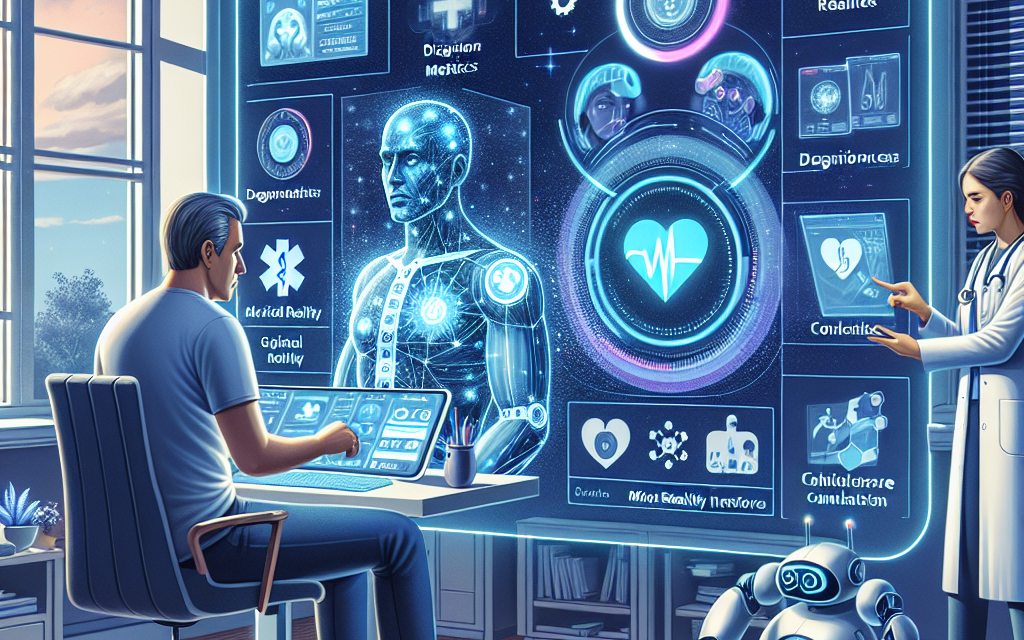The Future of Telemedicine: AI Innovations to Expect by 2025
Telemedicine has rapidly evolved over the past few years, especially in response to the COVID-19 pandemic, which necessitated a shift towards remote healthcare solutions. As we look towards 2025, the integration of artificial intelligence (AI) into telemedicine is set to revolutionize the way healthcare is delivered. This article explores the future of telemedicine, focusing on five key areas where AI innovations are expected to make a significant impact.
1. Enhanced Diagnostic Capabilities
One of the most promising applications of AI in telemedicine is its ability to enhance diagnostic capabilities. AI algorithms can analyze vast amounts of medical data, including images, lab results, and patient histories, to assist healthcare providers in making more accurate diagnoses.
For instance, AI-powered imaging tools are already being used to detect conditions such as cancer, pneumonia, and fractures with remarkable accuracy. A study published in the journal *Nature* found that an AI system developed by Google Health was able to outperform human radiologists in breast cancer detection, reducing false positives and false negatives significantly.
By 2025, we can expect the following advancements in AI diagnostic tools:
- Integration with Electronic Health Records (EHR): AI systems will be able to access and analyze EHRs in real-time, providing clinicians with insights that can lead to quicker and more accurate diagnoses.
- Predictive Analytics: AI will utilize historical data to predict potential health issues before they arise, allowing for proactive management of patient care.
- Tele-radiology Enhancements: AI will streamline the process of interpreting medical images, enabling remote specialists to provide faster consultations.
Moreover, AI can assist in triaging patients by analyzing symptoms reported during telehealth visits. For example, chatbots powered by natural language processing (NLP) can interact with patients, gather information, and suggest whether they need to see a doctor or if they can manage their symptoms at home. This not only saves time for healthcare providers but also improves patient satisfaction by reducing wait times.
2. Personalized Treatment Plans
As healthcare moves towards a more personalized approach, AI will play a crucial role in developing individualized treatment plans. By analyzing a patient’s genetic makeup, lifestyle choices, and medical history, AI can help healthcare providers tailor treatments that are more effective for each individual.
For example, AI algorithms can analyze genomic data to identify which medications are likely to be most effective for a particular patient based on their genetic profile. This is particularly relevant in fields such as oncology, where targeted therapies can significantly improve outcomes for cancer patients.
By 2025, we can expect the following developments in personalized treatment through AI:
- AI-Driven Genomic Analysis: Tools that analyze genetic data will become more accessible, allowing for routine use in clinical settings.
- Behavioral Analytics: AI will analyze patient behavior and adherence to treatment plans, providing insights that can help modify approaches to improve outcomes.
- Real-Time Monitoring: Wearable devices will collect data on patients’ health metrics, which AI can analyze to adjust treatment plans dynamically.
Case studies have already shown the effectiveness of personalized medicine. For instance, the use of AI in the treatment of diabetes has led to the development of personalized insulin dosing algorithms that consider individual patient data, resulting in better glycemic control. As these technologies become more widespread, we can expect a significant shift in how treatments are prescribed and managed.
3. Improved Patient Engagement and Experience
Patient engagement is a critical component of effective healthcare delivery. AI innovations are set to enhance patient experience by providing tools that facilitate communication, education, and support throughout the healthcare journey.
AI-powered chatbots and virtual health assistants are already being used to answer patient queries, schedule appointments, and provide medication reminders. These tools not only improve accessibility but also empower patients to take an active role in their healthcare.
By 2025, we can anticipate the following advancements in patient engagement through AI:
- 24/7 Availability: AI chatbots will provide round-the-clock support, allowing patients to access information and assistance whenever they need it.
- Personalized Health Education: AI will deliver tailored educational content based on individual patient needs, helping them understand their conditions and treatment options better.
- Feedback Mechanisms: AI systems will analyze patient feedback to improve services and address concerns proactively.
For example, a study conducted by the Mayo Clinic found that patients who interacted with AI chatbots reported higher satisfaction levels due to the immediate responses and support they received. As these technologies evolve, we can expect even greater improvements in patient engagement, leading to better health outcomes.
4. Streamlined Administrative Processes
Administrative tasks in healthcare can be time-consuming and often detract from the time clinicians spend with patients. AI has the potential to streamline these processes, allowing healthcare providers to focus more on patient care.
AI can automate various administrative tasks, such as scheduling appointments, managing billing, and processing insurance claims. By reducing the administrative burden, healthcare organizations can improve efficiency and reduce costs.
By 2025, we can expect the following innovations in administrative processes through AI:
- Automated Scheduling: AI systems will optimize appointment scheduling based on patient needs and provider availability, reducing no-show rates and improving resource allocation.
- Claims Processing: AI will streamline the insurance claims process, reducing errors and speeding up reimbursements for healthcare providers.
- Data Management: AI will assist in managing patient data, ensuring compliance with regulations while improving accessibility for healthcare providers.
For instance, a healthcare organization that implemented AI-driven scheduling reported a 30% reduction in appointment cancellations and a significant increase in patient satisfaction. As AI continues to evolve, we can expect even more sophisticated solutions that will transform administrative workflows in telemedicine.
5. Ethical Considerations and Challenges
While the potential benefits of AI in telemedicine are immense, there are also ethical considerations and challenges that must be addressed. Issues such as data privacy, algorithmic bias, and the need for regulatory frameworks are critical to ensuring that AI technologies are used responsibly in healthcare.
Data privacy is a significant concern, as telemedicine involves the collection and storage of sensitive patient information. Healthcare organizations must ensure that they comply with regulations such as HIPAA in the United States to protect patient data from breaches and unauthorized access.
Algorithmic bias is another challenge that must be addressed. AI systems are only as good as the data they are trained on, and if that data is biased, it can lead to disparities in care. For example, an AI system trained predominantly on data from one demographic group may not perform well for patients from other backgrounds.
By 2025, we can expect the following developments in addressing ethical considerations in AI:
- Stronger Regulatory Frameworks: Governments and regulatory bodies will likely establish guidelines for the ethical use of AI in healthcare, ensuring accountability and transparency.
- Bias Mitigation Strategies: AI developers will implement strategies to identify and mitigate bias in algorithms, promoting equitable healthcare delivery.
- Patient Consent and Control: Patients will have more control over their data, with clear options for consent and the ability to opt-out of data sharing.
As the telemedicine landscape evolves, it is crucial for stakeholders to prioritize ethical considerations to build trust and ensure that AI technologies benefit all patients equally.
Conclusion
The future of telemedicine is poised for transformation through AI innovations by 2025. Enhanced diagnostic capabilities, personalized treatment plans, improved patient engagement, streamlined administrative processes, and a focus on ethical considerations will shape the next generation of healthcare delivery. As we embrace these advancements, it is essential to remain vigilant about the challenges and responsibilities that come with integrating AI into telemedicine.
By leveraging AI technologies responsibly, healthcare providers can improve patient outcomes, enhance the overall healthcare experience, and create a more efficient system that meets the needs of diverse populations. The journey towards a more connected and intelligent healthcare ecosystem is just beginning, and the possibilities are limitless.





